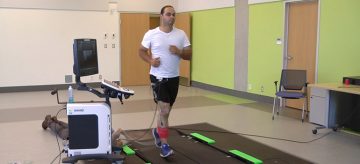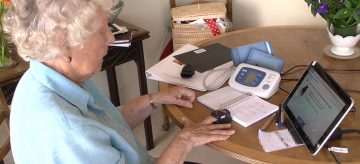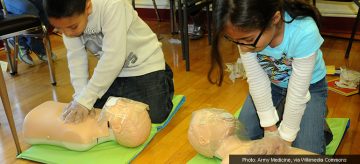Heart & Lung Health
Finding the ticking time bombs
By bkladko | May 16, 2018
Tango instructor Bobbi Lusic (pictured here with his wife, Patricia) had a heart attack at 45. That’s why he became part of a UBC project called SAVE BC.
UBC contributes to international hunt for asthma genes
By bkladko | December 22, 2017
Denise Daley led the Canadian arm of the study, which found five new genes associated with the condition.
A hidden threat of high cholesterol – weakened tendons
By bkladko | December 18, 2017
A UBC team analyzes the damage that cholesterol inflicts on the Achilles tendon, and looks for ways to improve diagnosis.
UBC tries tele-health to stop revolving door for chronic heart and lung patients
By bkladko | November 21, 2017
TEC4Home is the largest-ever clinical trial of tele-health in Canada.
Education can make difference in cardiac arrest outcomes
By bkladko | October 4, 2017
Comprehensive public health initiatives around CPR and defibrillation led to greater use of the procedures, especially at home.
UBC recognizes three of Canada’s top health scientists
By bkladko | August 30, 2017
Stanley Nattel, Ian Mackenzie and Eduardo Franco are being honoured for their accomplishments in heart health, brain health and cancer.
UBC finds potential biomarker for a surprising health hazard
By bkladko | June 23, 2017
The Western red cedar, B.C.’s official tree, causes asthma in some people who cut and mill it.
Yeast found in babies’ guts increases risk of asthma
By jwong | February 17, 2017
Microbiologist Brett Finlay will now re-examine the Canadian samples and look for the presence of yeast in the gut of infants.
UBC maps cardiac arrest across metro Vancouver
By bkladko | December 9, 2016
Neighborhoods with higher proportions of ethnic Chinese residents had a higher frequency of bystanders performing cardiopulmonary resuscitation.
Asthma medication adherence would have dramatic effect on health costs
By bkladko | December 6, 2016
90 per cent of asthma patients have asthma that could be controlled, but only 25 to 30 per cent of patients are managing their condition properly.









